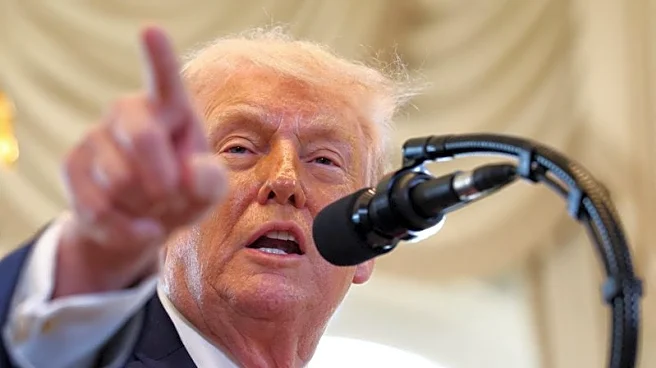What's Happening?
U.S. stocks experienced gains as major banks reported better-than-expected earnings and technology firms provided strong revenue forecasts. The S&P 500 and Nasdaq Composite both ended Wednesday's session
in positive territory, with the S&P 500 rising by 0.4% and the Nasdaq adding 0.7%. Notable contributors to the market's performance included Nvidia, Broadcom, and Salesforce, which saw significant stock increases following positive financial guidance and earnings reports. Despite these gains, the market faces volatility due to ongoing U.S.-China trade tensions, with President Trump threatening additional tariffs on Chinese goods. The Cboe Volatility Index, a measure of market fear, remained elevated, reflecting investor concerns over trade disputes and a prolonged U.S. government shutdown.
Why It's Important?
The positive earnings reports from major banks and tech companies are crucial as they provide a counterbalance to the negative impact of U.S.-China trade tensions on the stock market. Strong performance in these sectors can bolster investor confidence and stabilize market conditions. However, the reliance on a few dominant tech stocks raises concerns about concentration risk, which could lead to increased market vulnerability if these stocks falter. The ongoing trade tensions and government shutdown add layers of uncertainty, potentially affecting economic data releases and investor sentiment. These factors could influence market dynamics and economic policy decisions in the near future.
What's Next?
Investors will continue to monitor the U.S.-China trade situation, particularly any developments regarding tariffs and export controls. The prolonged government shutdown may lead to delays in economic data releases, impacting market analysis and decision-making. Stakeholders will also watch for further earnings reports from other sectors to assess the broader economic impact. The market's reliance on tech stocks may prompt discussions on diversification strategies to mitigate concentration risks. Political leaders and businesses may need to address these economic challenges to ensure market stability.
Beyond the Headlines
The current market conditions highlight the ethical and strategic considerations of relying heavily on a few tech giants to drive economic growth. This concentration could lead to increased scrutiny from regulators and policymakers concerned about market fairness and competition. Additionally, the trade tensions underscore the geopolitical complexities of global supply chains, which may prompt companies to reassess their international strategies and dependencies.










